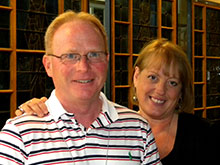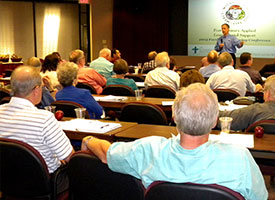By Paula Schlueter Ross
In more than a dozen years of ministry, the Rev. Steve Riordan feels like he’s come full circle.
As a new pastor in 1999, Riordan took part in what was then a new LCMS program called Post-Seminary Applied Learning and Support, or PALS, that periodically brought him and his wife, Sharon, together with other new pastors and their wives.

The idea was simple: To help new seminary graduates adjust to the myriad of changes — and challenges — they typically face in their first calls to congregations, bring them together for mutual sharing and support in a collegial, confidential environment.
It worked for the Riordans — who called the experience “positive” and “definitely helpful” — so much so that the two began serving this July as leaders of a 14-member PALS group in the Chicago area. Steve Riordan is pastor of Grace Lutheran Church in Western Springs, Ill., a Chicago suburb.
As a former circuit counselor, Riordan said he often was called to deal with pastoral situations “after the hand grenade had already exploded, and then you’ve got to try to put pieces back together again. And it doesn’t work out so well.
“I think what PALS does is it helps people not ‘pull the pin’ in the first place,” he explained, adding that the program is designed to make the seminary-to-parish transition — as well as handling parish interactions and learning the nuts-and-bolts of day-to-day ministry — “a lot smoother.”
Adds Sharon Riordan: “Steve’s been a pastor for 14 years — and you learn things in 14 years. As corny as this sounds, [PALS] is a great way to give back. It’s a great way to share what we’ve already learned” with those who are just starting out.
The Riordans were among 23 PALS facilitator pastors and 19 wives who attended an Aug. 6-7 training conference at the LCMS International Center in St. Louis. The conference, held annually, discusses the purpose of the PALS program, the roles and responsibilities of facilitator couples, “best practices and good ideas” and curriculum.
PALS facilitators are selected by their district presidents. Then, when needed, they are invited to serve by the PALS staff. In that role, they are charged with contacting new pastors in their areas and inviting them to attend PALS meetings that the facilitators have planned — typically as many as six times a year.
Those meetings may include guest speakers and specially designed PALS courses on topics such as “Communications and Conflict,” “Preaching: The Heart and the Art,” “Pre-Marital Pastoral Care,” “Stewardship in the Local Congregation” and “The Pastor’s Time Management, Priorities and Boundaries.” (Continuing Education Units are available for PALS courses.)
“The continuing education and growth that PALS provides for new pastors and their wives is a major emphasis of PALS,” said the Rev. Dr. Glen Thomas, executive director of the LCMS Office of Pastoral Education. “Over the past three years we have been asking new pastors and wives to identify study topics they would find helpful, and we have added to the PALS curriculum accordingly.”
The gatherings also are open to discussions about challenges in the new pastors’ ministries — such as loneliness, debt, time management and conflicts with church members or staff.
But, although they are free to offer their own insights, PALS facilitators are not asked to be mentors: their job is to encourage their PALS “collegial learning group” so that members of the group can learn from — and help — one another.
Also in the mix is fellowship: many PALS groups hold family retreats so members can connect with others who are serving their first calls and enjoy a little “down time” together.
With only about half of the Synod’s new seminary graduates involved in PALS, this year’s conference-goers spent time talking about how to recruit more pastors to the program.
In his opening address, LCMS First Vice-President Rev. Dr. Herbert Mueller Jr. explained the history of the 15-year-old PALS program and emphasized that PALS has always sought to be “nonpolitical.” The aim has always been, he said, to help new pastors make a good start in ministry.
“We are not in the business of encouraging men to take one side or another,” Mueller said, adding that PALS groups are designed to be “safe places” for the participants and their families to learn and grow and to help one another.
The focus of the program, he told Reporter, “is Christ and His Word. He makes us alive and He gives us ‘life together.’ ”
Citing surveys of Synod pastors, Mueller told the conference that a significant number of PALS participants stay in their first calls longer than those who did not participate in PALS. “Certainly there is a blessing and benefit to PALS,” he said.
PALS Coordinator Carrie O’Donnell — who also took part in a PALS group with her husband, the Rev. Lance O’Donnell, early in his ministry — told facilitators’ wives that the program is intended “to help you thrive, not just survive.”
Yet, some congregations — which are asked to cover travel and lodging costs for their pastors’ PALS meetings — still don’t seem to understand what PALS is and why it’s important, she said.
During the conference, three PALS facilitator couples shared their recruitment practices, and a panel of seven PALS group members shared their experiences with the program.
Among the reasons mentioned for why some new pastors don’t join PALS groups: a lack of time; they’ve just completed seminary studies and aren’t ready for continuing education; meetings aren’t convenient for them or their wives; they view it as nothing more than a “gripe session”; they’re doing fine in their first calls and feel like they don’t need it.
Those who joined a PALS group said it was helpful to them in many ways, including: it made their ministry outlook more positive; it provided “a safe place” to talk about struggles; they were “treated like royalty” by their facilitators, who provided favorite snacks and small gifts; meetings were “open and honest” and included “top-notch speakers”; “the learning was great, but the support was more important”; it was beneficial for sermon writing; it validated the contributions of pastors’ wives and made them feel valuable to the ministry.
Thomas said he would “absolutely” like to see every one of the Synod’s new pastors join PALS.
“PALS provides a wonderful combination of continuing education, spiritual and attitudinal growth and fellowship for both pastors and their wives,” Thomas told Reporter.
And, he noted, this summer’s LCMS convention delegates seemed to agree by overwhelmingly adopting Resolution 5-02A. Noting that “the transition from seminary to congregation for first-call pastors and their wives is a significant and critical transition for them and for the congregations involved,” the resolution calls for support and encouragement from the Synod’s seminaries, districts and congregations so that new pastor couples take part in PALS.
Even if a new pastor doesn’t think he needs help or support, his participation in PALS would surely benefit others, Thomas noted.
“I continue to believe that PALS is one of the best ideas our Synod has had,” he added, “and we continue to work in order to make it even more effective in serving new pastors and their wives during the first three years of parish life.”
The Rev. Dr. David and Kathy Ludwig of Hickory, N.C. — who have led marriage-enrichment seminars and continue to assist with presentations and retreats for Grace Place Lutheran Wellness Ministries — have been PALS facilitators for just a year but “know the importance of it,” says David, because they “know the importance of connecting people.”
PALS is like an “oasis,” he said, that “keeps [new pastors and their wives] from getting isolated, it really gives them a whole different perspective and a hope and a vision” and is “incredibly valuable” in keeping them in the ministry.
Kathy, a retired teacher, adds, “I might be married to a pastor and a psychologist, but everyone needs support. Even us.” Through PALS, she said, “we want to make a safe place for them to share their joys and their support.”
The Rev. Bill and Janis Hessler, who are starting their fourth year as PALS facilitators in Saginaw, Mich., view the annual conference as a sort of “PALS group” for facilitators, since they also share their own experiences and learn from the experiences of others.
“Getting together with the other facilitators and being able to see some of the challenges that they have, and the general sharing — it’s helpful for me,” Bill said.
Janis called PALS “a great program” and said “it gives you hope for the future of the church to see [the new pastors]. It’s like we’re passing the torch, because we’re nearing retirement and they’re taking over.”
The Rev. Bill Wilson, associate pastor of Timothy Lutheran Church in St. Louis, has been a PALS facilitator, along with his wife, Brenda, for more than 5 years. Members of their PALS group realize the importance of the program, he said, “not only [for] what they can give, but what they can gain.”
Ministry problems might still be there after a PALS meeting, Wilson said, “but I think [pastors] take on a different perspective when they have this group to network with.”
An unexpected bonus, he added, is that, even though members of his PALS group may not see eye-to-eye on so-called church politics, they’ve bonded.
“When we go to pastors conferences, these guys are all sitting together,” Wilson told Reporter. “It doesn’t matter which side of the political wall they’re on. That’s what’s really neat. I think the long-term will really be beneficial.”
For more information about the PALS program, contact the Rev. Dr. Glen Thomas at glen.thomas@lcms.org or 314-996-1258.
Posted Aug. 20, 2013

